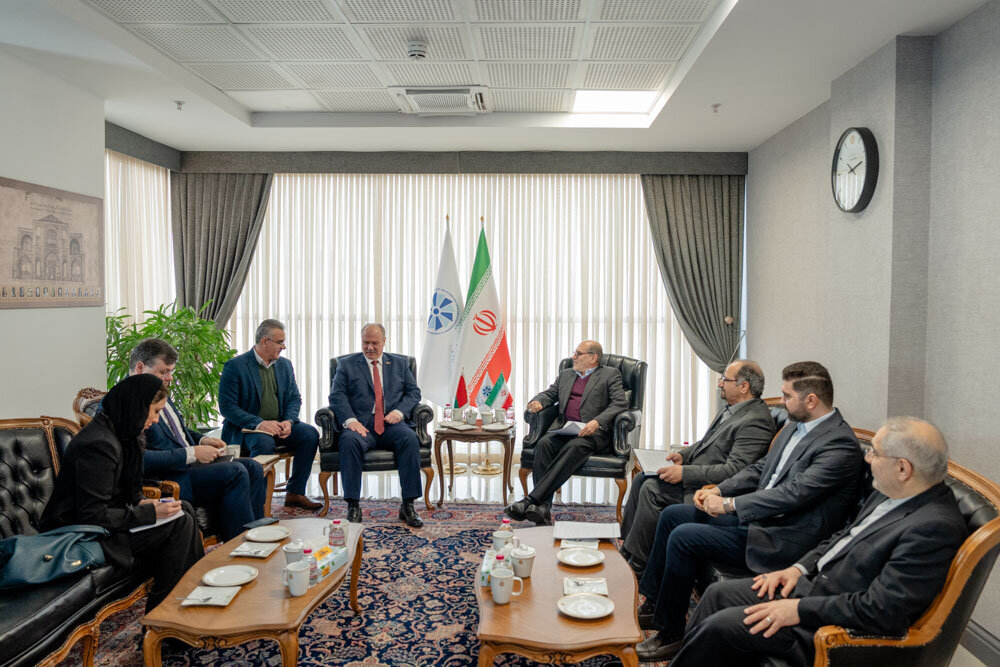TCCIMA calls for leveraging chambers coop to boost IranBelarus economic ties
TCCIMA calls for leveraging chambers’ co-op to boost Iran-Belarus economic ties
TEHRAN - Mojtaba Najafi Arab, the head of the Tehran Chamber of Commerce, Industries, Mines and Agriculture (TCCIMA) and Dmitry Koltsov, the Belarusian ambassador to Iran, discussed avenues for expanding economic and trade relations during a meeting.

The two officials emphasized the importance of the recently finalized free trade agreement between Iran and the Eurasian Economic Union (EAEU) as a practical tool for advancing bilateral trade.
As the TCCIMA portal reported, Koltsov described the agreement as a new gateway for enhancing Iran’s trade with the EAEU and underscored the vital role of chambers of commerce in fostering trade.
He highlighted the potential collaboration between the Tehran and Minsk chambers in shaping the future of economic relations between Iran and Belarus, a member of the EAEU.
Najafi Arab acknowledged the current low trade volume between Iran and Belarus but noted the high industrial and economic potential of both nations.
He emphasized the necessity of utilizing existing opportunities to strengthen economic ties.
He stated that the Tehran and Minsk chambers could serve as key platforms for identifying investment opportunities, fostering trade cooperation, and introducing reputable businesses from both countries.
The TCCIMA head also referred to the upcoming Third International Eurasia Trade Exhibition, scheduled for February 21-24, at Tehran's Permanent International Fairground, noting that the Tehran Chamber plans to invite officials and trade delegations from EAEU member countries to this event to initiate discussions aimed at enhancing private-sector collaboration.
During the meeting, Fereydoun Vardinejad, Secretary-General of the TCCIMA, stressed the importance of timely information exchange on economic and investment opportunities.
He expressed the Tehran Chamber’s readiness to collaborate with the Minsk Chamber to share investment prospects and connect reliable partners from both sides.
He also proposed establishing a Tehran-Minsk Economic Cooperation Council during the Eurasia trade exhibition to address challenges, explore opportunities, and facilitate private-sector engagement between Iran and Belarus.
Koltsov for his part praised the productive relationship between the Tehran Chamber and the Belarusian Embassy, emphasizing the potential for growth in bilateral trade.
He referred to last week’s Iran-Belarus Joint Economic Committee meeting in Minsk, chaired by Iran’s Minister of Industry, Mine, and Trade, where several agreements were signed.
The ambassador highlighted the free trade agreement with the EAEU as an ideal opportunity to increase trade and investment between Iran and member states. He also emphasized the role of chambers of commerce in implementing the agreement’s provisions and reaffirmed the Belarusian Embassy's commitment to constructive collaboration with the Tehran Chamber to strengthen economic ties.
He further noted opportunities for joint investment and production in Belarus as promising areas for expanding economic cooperation.
Hesamodin Hallaj, Deputy for International Affairs at the Tehran Chamber, also attended the meeting.
He reviewed the Tehran Chamber’s history of cooperation with the Belarusian Embassy and discussed the upcoming Eurasia trade exhibition, highlighting its significance in fostering economic partnerships.
During a meeting between Head of Iran Chamber of Commerce, Industries, Mines, and Agriculture (ICCIMA) Samad Hasanzadeh and Belarusian ambassador to Iran, back in early December 2024, the ICCIMA head stressed the need for enhancing bilateral financial exchanges through joint mechanisms and the use of local currencies.
Hassanzadeh emphasized the significance of joint investments and innovative financial arrangements such as barter trade and local currency usage to reduce reliance on the US dollar.
The trade volume between Iran and Belarus, amounting to approximately $400 million, does not reflect the true potential of both countries, Hassanzadeh said. He highlighted various sectors, including oil, petrochemicals, energy, advanced technologies, engineering services, machinery, construction materials, transportation equipment, chemicals, steel, food products, agricultural goods, and pharmaceuticals, as areas ripe for enhanced cooperation.
Hassanzadeh noted that Iran has been importing part of its needs for agricultural and livestock inputs from Belarus, expressing a willingness to expand cooperation in these sectors. He invited Belarusian investors to explore joint ventures in pharmaceuticals, medical equipment, livestock, and dairy products, citing Iran’s secure environment for investment.
Tourism was also spotlighted, with Hassanzadeh urging measures to facilitate tourist and business visas and establish direct flights between the two nations to promote people-to-people ties.
Ambassador Koltsov echoed the sentiments, noting the strong political ties between the two countries. He outlined plans to expand economic collaboration, including the establishment of a joint trade house in Minsk as part of the two countries' joint economic commission.
Koltsov also mentioned the need to update and implement a previously signed cooperation agreement between the chambers of commerce in Iran and Belarus, expressing optimism about fostering closer ties between the business operators of both nations.
EF/MA
source: tehrantimes.com